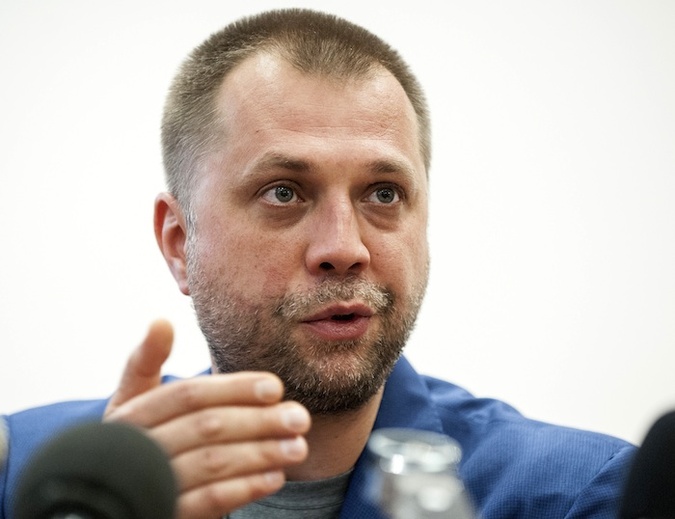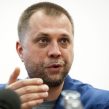
Donetsk ‘Republic’ Leaders’ Morale Plummeting
Publication: Eurasia Daily Monitor Volume: 11 Issue: 141
By:

Intercepts of Moscow-Donetsk telephone conversations, made public by Ukraine’s Security Service (SBU), reveal pessimism and demoralization on the part of at least some of the secessionist “republic’s” leadership. On July 28, the SBU released audio recordings with transcripts of two telephone conversations, both initiated from Moscow to Donetsk (sbu.gov.ua, July 28).
In the first conversation, Aleksei Chesnokov, identified as Deputy Secretary of the ruling United Russia Party’s General Council (a 152-member body, equivalent to the erstwhile Communist Party of the Soviet Union’s Central Committee) discusses the situation with the “Donetsk People’s Republic [DPR] prime minister” Aleksandr Boroday. In the second conversation, the departed chairman of the “DPR’s parliament,” Denis Pushilin, listens in Moscow to the “republic’s deputy prime minister” Andrei Purgin assessing the situation in Donetsk. Both Boroday and Purgin complain in tones of utter exasperation.
Boroday complains that “the situation here is absolutely rotten, everything is a mess. We have the ‘rule of seven boyars’ here [a reference to anarchy in Muscovy’s ‘time of troubles’; allusion to Donetsk’s squabbling military commanders].” The military situation is shitty.” The “state security minister” and Vostok battalion commander, Aleksandr Khodakovsky, is not coordinating with anyone other than Boroday himself, Boroday reports. But he “does not really trust” Khodakovsky.
Business in Donetsk—Boroday goes on—is being subjected to “extortion from many sides, amid continuous shooting in the city.” His “government” has just met with Donetsk businessmen and proposed to introduce a 5-percent special surtax on profits (wartime tax). According to Boroday, economists recommended by Russia’s presidential administration have proposed this measure for Donetsk to implement. But regardless of any measures, “I see no economic prospects here.”
Boroday’s cash reserves, which (he says) he carried with him from Moscow, are running out. He expects more cash in a few weeks’ time. But this would only matter “provided that the situation holds up [i.e., “DPR” does not collapse]. But the situation will not hold up, if nothing changes in the military sphere [where Ukrainian forces are advancing on Donetsk].” A discouraged Chesnokov interjects: “well, if it will not hold up, it will not hold up.”
In Moscow, Chesnokov was calling to Donetsk while in the company (he said) of Father Tikhon—i.e. President Vladimir Putin’s reputed personal confessor, Tikhon Shevkunov. It was in this context that Chesnokov relayed a request via Boroday to Colonel Igor Girkin (a.k.a. Strelkov), code-named in their conversation as “The Legendary.” As “DPR’s” titular commander, Girkin/Strelkov is expected to give an interview or statement of allegiance to Putin, along the following suggested lines:
“As an officer, I have a Commander-in-Chief [Putin]. I do not take his orders directly at this time because I am in another state [i.e., with a proxy’s status]. But I respect him greatly; he is the most outstanding leader of contemporary times; Russia has risen from its knees thanks to him… [W]hatever decisions he makes, we will carry them out. He is the wise leader of the Russian world.” This exchange lifts a curtain’s corner on the Kremlin’s unhappiness with the Strelkov mythology in Russia’s ultranationalist camp.
The “DPR’s deputy prime minister” responsible for economic affairs, Andrei Purgin, complains to Pushilin in Moscow that Girkin/Strelkov seeks to micromanage Donetsk’s food and coal supply chains, and interferes with businesses in the city. He spends many hours daily granting audiences about business disputes, banking affairs, and other matters “inappropriate to him.” His men “plunder the city,” taking goods without receipts, on the basis that “we came from Sloviansk [claim to hero status].”
While deferring to Girkin/Strelkov’s military reputation, Purgin rejects the commander’s defense plans as “insane.” Girkin/Strelkov has proposed to Donetsk’s mayor to blow up some nine-story buildings on Donetsk’s outskirts, so as to slow down the Ukrainian forces. After that, Girkin/Strelkov would fight for Donetsk inside the city. The mayor, Oleksandr Lukianchenko, left the city under duress. According to Purgin, that kind of defense would “kill far fewer enemies than the peaceful people who are supposed to be defended… He [Girkin/Strelkov] would ruin this city of 1,000,000 people in order to kill 10,000 Ukry [ethnic slur for Ukrainians].”
The “DPR’s” military and political leadership has experienced turmoil and demoralization recently. Ukrainian forces are steadily advancing. The shooting down of the Boeing airliner removes any ability for the Donetsk and Luhansk “people’s republics” to obtain a modicum of international acceptance (see EDM, July 30). The latest telephone intercepts reflect this disarray.




